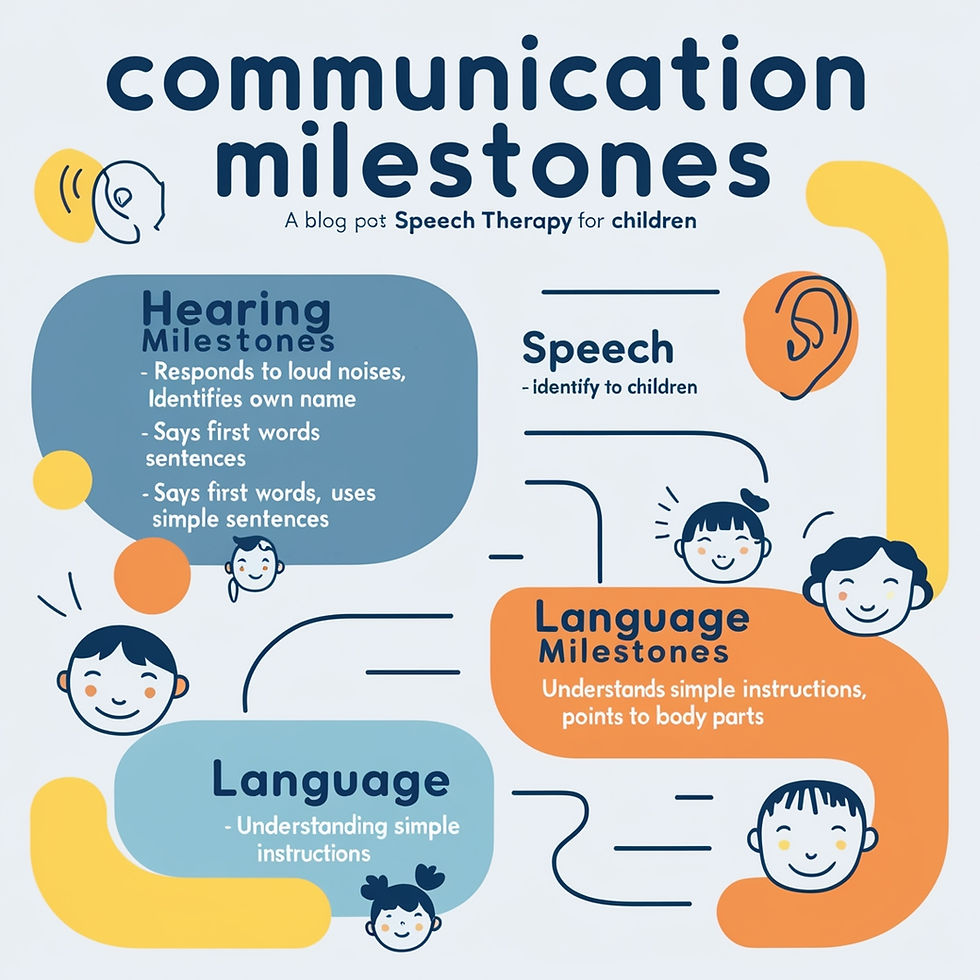Does My Child Have a Speech Delay?
- mrsphomm
- Jan 13, 2025
- 4 min read
As a parent, it’s natural to wonder and worry about your child’s development. Questions like, “My 3-year-old isn’t talking much; should I be concerned?” or “My son struggles to pronounce his sounds; does he need speech therapy?” are common and valid. If these thoughts have crossed your mind, you’re not alone. Many parents ask these same questions as they navigate their child’s growth. After six years of working in this field, I can confidently say that no two children develop speech and language skills in the exact same way or at the same pace.

While there is a wide range of what’s considered “typical” development, decades of research provide clear guidelines to help parents determine when it’s time to seek the expertise of a Speech-Language Pathologist (SLP). This is why organizations like the American Speech-Language-Hearing Association (ASHA) created the Identify the Signs campaign—to raise awareness about the early warning signs of communication disorders. By recognizing these signs early, parents can ensure their child receives the support they need to thrive.
What Are the Warning Signs of a Communication Disorder?
While every child develops at their own pace, there are certain milestones that serve as benchmarks for speech and language development. If your child is not meeting these milestones or showing specific red flags, it could indicate a speech or language delay. Here are some general guidelines:
For Babies (Birth to 12 Months):
Lack of response to sound or name.
Minimal or no babbling (e.g., “ba-ba” or “da-da”).
No attempt to imitate sounds or facial expressions.
For Toddlers (12 to 24 Months):
Limited vocabulary (fewer than 20 words by 18 months).
Difficulty following simple directions (e.g., “Come here” or “Where’s your ball?”).
Lack of interest in communicating, such as pointing, gesturing, or making eye contact.
For Preschoolers (2 to 5 Years):
Difficulty combining words into simple sentences by age 3.
Struggles with clarity of speech, making it hard for others to understand them.
Persistent stuttering or repetition of sounds.
Trouble understanding or using language to express needs and ideas.

Why Early Intervention Matters
The earlier a potential speech or language issue is identified, the better the outcome for your child. Early intervention allows your child to develop essential communication skills during the critical window of brain development.
Research shows that addressing speech and language delays early can:
Improve social and emotional development.
Enhance learning and academic performance.
Prevent future communication struggles that could affect confidence and relationships.
What Can Parents Do?
Observe and Take Notes Pay close attention to your child’s communication habits. Are they meeting typical developmental milestones? Are there specific sounds or words they’re struggling with? Documenting these observations can be helpful when consulting with a professional.
Engage in Play-Based Learning. Children learn best through play. Incorporate activities that encourage communication, such as reading books together, singing songs, or playing interactive games like “peek-a-boo” or “Simon Says.”
Talk to Your Pediatrician and share your concerns. They can provide guidance, conduct initial screenings, and refer you to a qualified Speech-Language Pathologist if needed.
Seek a Speech-Language Evaluation. A comprehensive evaluation by an SLP is the best way to understand your child’s unique needs. These assessments are tailored to pinpoint any areas of concern and create an individualized plan for intervention.
Innovative Solutions for Speech Development If your child is showing signs of a speech delay, don’t panic.
Many innovative approaches and tools can help support their development: Interactive Technology Speech therapy apps and interactive games designed for young learners can make practicing communication skills fun and engaging.
Parent Training Programs Many SLPs offer programs that teach parents strategies to encourage speech and language development at home.
Techniques like modeling correct speech, expanding on your child’s words, and providing positive reinforcement can make a significant difference.
When to Act Trust your instincts.
If you feel something isn’t quite right with your child’s speech or language development, it’s always better to seek help sooner rather than later. A simple consultation or evaluation can provide peace of mind or set your child on the path to success. Take the First Step Today If you’re in Macclenny, FL, and have concerns about your child’s speech or language development, we’re here to help.
Contact us for a free consultation or to schedule a comprehensive evaluation with a qualified Speech-Language Pathologist. Early action makes all the difference in empowering your child to communicate confidently and effectively.
Call Heart Speak Therapy today at 904-513-1382 or visit www.heartspeaktherapy.com to learn more and book an appointment.
FAQs :
What are the key developmental milestones my child should reach by their age, and how do I know if they are falling behind?
By understanding typical speech and language milestones, you can gauge whether your child is on track. For example, by 2 years, your child should be combining two words and have a vocabulary of 200–500 words. If your child isn’t reaching these milestones, it’s worth consulting with an SLP for an evaluation.
At what point should I seek professional help if my child isn’t talking or is hard to understand?
You should seek help if your child shows warning signs like not babbling by 12 months, saying fewer than 50 words by age 2, or being difficult to understand by age 3. Early intervention can significantly improve outcomes, so don’t wait to consult a professional.
What are some activities or strategies I can use at home to encourage my child’s speech development?
You can support your child by narrating daily routines, reading books together, and playing games that involve naming objects or making animal sounds. Encourage imitation by repeating sounds or words your child attempts to say and celebrating their efforts.
.png)





Comments